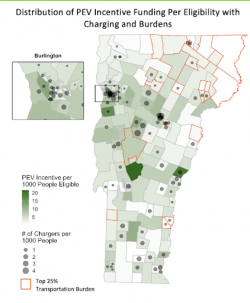
- About
- Education
- Research
- Thought Leadership
- Engagement
- News & Events
Back to Top Nav
Back to Top Nav
Back to Top Nav
Back to Top Nav
Back to Top Nav
Ellery Curtis '22 shares her experiences with two energy-related internships during the summer of 2021.
Heading into my junior summer, I knew that I wanted an internship focused on energy. A government and environmental policy major, I'm not the typical candidate for the energy industry. However, my interest in energy was piqued by Irving Institute Director Elizabeth Wilson's ENVS12: Energy and the Environment class, where I was introduced to the exciting nature of energy and the complex regulatory systems behind the scenes. Energy policy, I realized in that class and in subsequent internships, could be a doorway into solving climate change and creating a more equitable society.
My internship search took me full circle in the energy policy domain, from government agencies to utilities to nonprofits. Eventually, I ended up with two offers, one in my home state of Vermont with the Energy Action Network (EAN) and another part-time offer with the Massachusetts Executive Office of Energy and Environmental Affairs (EEA).
EAN is a network of hundreds of nonprofits, businesses, agencies and organizations in Vermont working to inform policymakers on how to meet the state's renewable energy commitments. The EAN internship is structured to be outcomes and impact-based with the goal of publishing research that furthers EAN's mission in some way. To that end, each intern could choose an issue to focus on. Having previously worked on equitable policymaking for Vermont's Climate Council, and recognizing that the lion share of Vermont's greenhouse gas emissions comes from the transportation sector, I chose to focus on equity in transportation decarbonization. I found this area of study to be largely overlooked in Vermont so far; policymakers had funded clean transportation programs but never comprehensively assessed their efficacy from an equity or justice lens.
To begin, I identified and interviewed electric vehicle policy experts around the state and eventually sourced data on where our clean transportation incentives funding had been distributed by census tract. After a long data wrangling phase, I created spatial visualizations of funding amounts compared to indicators of equity. The example above shows how the Low Income Electric Vehicle Incentive Program is being taken up in urban areas where charging infrastructure already exists, and not in the areas where transportation burden (the percent of one's income spend on transportation and thus need for cheaper options) is the highest.
At the same time that I was exploring equity on the mitigation side of the climate equation, I also had the opportunity to think about adaptation in a coastal state that has historically led the way on climate policy. The Massachusetts Environmental Policy Act Office (MEPA) within the EEA was in the process of integrating climate resilience design standards and guidelines into infrastructure (including many energy-related projects) and asset planning, and I was tasked with testing a new climate resiliency tool to gauge its usefulness to the MEPA office. I researched potential projects, input assumptions about things like ecosystems benefits, climate exposure, and asset criticality and collected data on the outputs.
It was interesting to see how state agencies are starting to seriously consider climate risk in their infrastructure planning decisions and what that looks like in practice. It was also cool to compare Massachusetts's approach to how Regional Transmission Organizations are integrating climate resiliency into their own planning activities, having researched that topic last year with Elizabeth Wilson as part of an undergraduate research assistantship. In my experience, states are making more of an effort than RTO's, but changing systems will definitely be an iterative process that will only become more urgent.
The MEPA internship was supported by the Institute's mini-grant program. Thanks to them, I was able to simultaneously explore transportation equity and climate resiliency—two very different topics that allowed me to explore ways I might make an impact on climate change. Having worked on energy policy now from the nonprofit and state government lenses, I hope to enter the private sector next year in order to build on my technical skills to confidently inform energy policy discussions in my future career.
____________________
After graduating from Dartmouth in 2022, Ellery took a position at the Brattle Group.